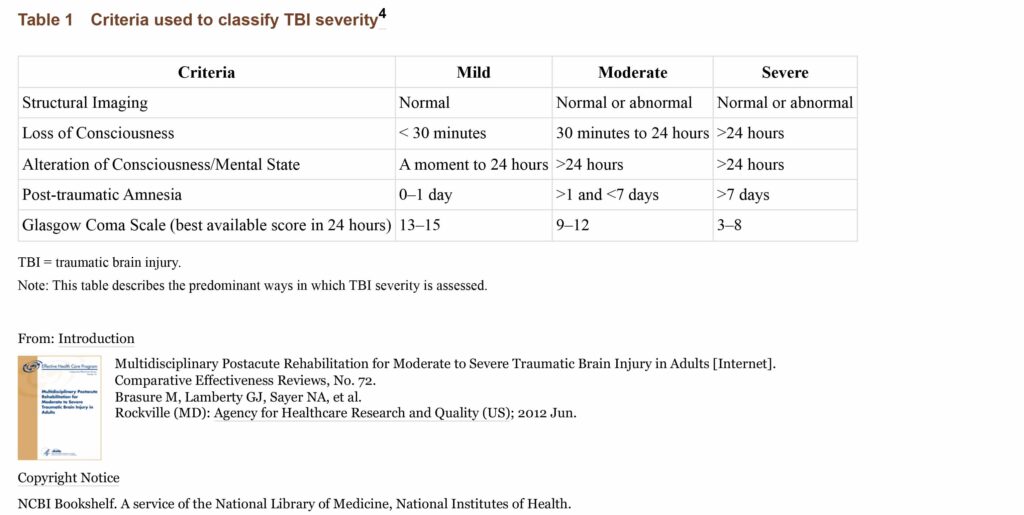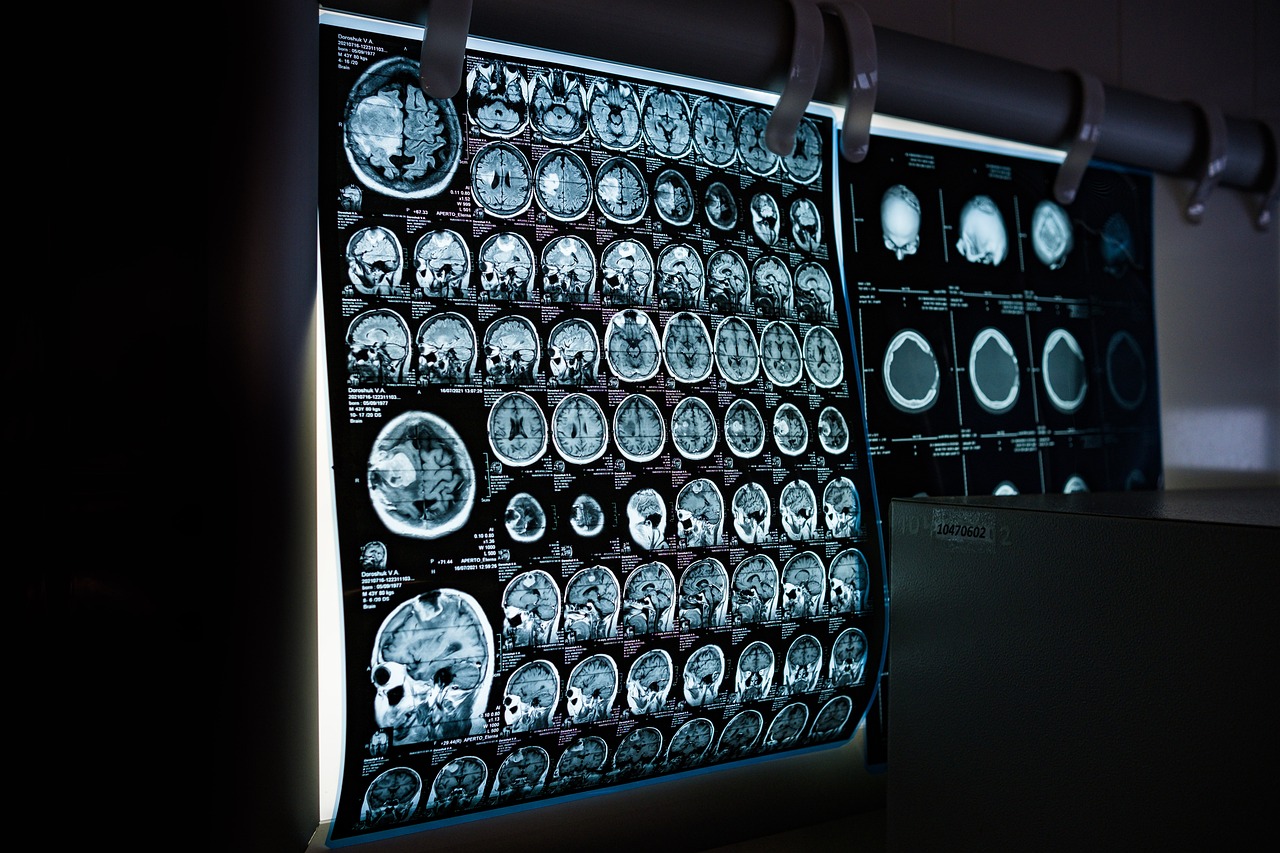Traumatic Brain Injury (TBI) is a lot to think about. During my TBI recovery I was confused. Why did I have a Severe TBI? What is the diagnosis criteria to verify the difference between mild, moderate, and severe Traumatic Brain Injury? I delved into TBI criteria and here’s what I found.
A quick reminder that I am not a doctor. If this screams alarms in you please consult a medical professional and discuss. TBI diagnosis has it’s challenges and it’s best to work with the professionals in the medical community to move forward.
During my recovery from Traumatic Brain Injury I was invested in learning more about the medical concerns that now effect me. I found this chart in the National Library of Medicine. This is a .gov website and not a sponsored post. I never knew that there was a governmental website dedicated to a medical library. It’s a fantastic resource for more than just TBI recovery. I specifically found a study in regards to my condition: Severe TBI.
Criteria used to Classify TBI Severity

Mild Traumatic Brain Injury
Mild TBI, also known as a concussion, is the least severe form of TBI. It is characterized by a Glasgow Coma Scale score of 13-15, which indicates a mild or brief loss of consciousness (if any) and post-traumatic amnesia typically lasting less than 24 hours. Symptoms of mild TBI can include headache, dizziness, confusion, memory problems, temporary loss of consciousness, and sensory disturbances. Most individuals with mild TBI recover within a few weeks with appropriate rest and management.
Moderate Traumatic Brain Injury
Moderate TBI involves a Glasgow Coma Scale score of 9-12, indicating a more significant loss of consciousness (ranging from a few minutes to several hours) and post-traumatic amnesia lasting up to 24 hours. The effects of moderate TBI can be more pronounced and long-lasting compared to mild TBI. Symptoms may include prolonged confusion, significant memory impairment, mood changes, physical impairments, and a longer recovery period. Rehabilitation and comprehensive care are often required for optimal recovery.
Severe Traumatic Brain Injury
Severe TBI is the most severe and life-threatening form of brain injury. It involves a Glasgow Coma Scale score of 3-8, indicating a prolonged loss of consciousness (usually more than six hours) and post-traumatic amnesia exceeding 24 hours. Severe TBI can result in significant cognitive, physical, and behavioral impairments. Individuals may experience prolonged unconsciousness, severe memory loss, significant motor deficits, sensory impairments, and personality changes. Recovery from severe TBI can be challenging and may require intensive medical interventions, prolonged rehabilitation, and long-term support.
Glasgow Coma Scale?

The Glasgow Coma Scale (GCS) is often referenced when discussing Traumatic Brain Injury. GCS is a standardized neurological assessment tool used to evaluate the level of consciousness and neurological function in individuals, particularly those with brain injury. It assesses three key aspects: eye opening response, verbal response, and motor response.
- Eye Opening Response: The person’s ability to open their eyes is evaluated and assigned a score ranging from 1 to 4, with 4 indicating spontaneous eye opening, 3 for opening in response to voice, 2 for opening in response to pain, and 1 for no eye opening.
- Verbal Response: The person’s verbal interactions or vocalizations are assessed and given a score from 1 to 5, with 5 representing normal conversation and orientation, 4 for disoriented conversation, 3 for inappropriate words, 2 for incomprehensible sounds, and 1 for no verbal response.
- Motor Response: The person’s motor movements and responses to stimuli are examined and assigned a score from 1 to 6, with 6 indicating normal movements, 5 for localized response to pain, 4 for withdrawal from pain, 3 for abnormal flexion (decorticate posturing), 2 for abnormal extension (decerebrate posturing), and 1 for no motor response.
The individual scores from the three categories are then added together to obtain the overall GCS score, which ranges from 3 (indicating deep unconsciousness) to 15 (indicating full consciousness). A higher score represents a higher level of consciousness and neurological functioning.
Conclusion
Through a chart such as these there are some other conclusions that can be deduced. Hollywood is wrong in more things than only explosions. Wacking someone on the head and they don’t wake up for a few hours is a Moderate Traumatic Brain injury.
Discussions regarding concussions are frequent and, in my opinion, flippant. SoandSo got a concussion playing football, but they continued playing football. Excuse me. That’s Traumatic Brain Injury. In a social aspect a concussion is treated less seriously as a TBI even though they are the same thing. Take care of concussion diagnosis. Traumatic Brain Injury, no matter how mild deserves care.
Thank you for growing and learning with me!
– Rachel
Founder, creator, TBI Survivor, and designer of:

Citations:
Brasure M, Lamberty GJ, Sayer NA, et al. Multidisciplinary Postacute Rehabilitation for Moderate to Severe Traumatic Brain Injury in Adults [Internet]. Rockville (MD): Agency for Healthcare Research and Quality (US); 2012 Jun. (Comparative Effectiveness Reviews, No. 72.) Table 1, Criteria used to classify TBI severity. Available from: https://www.ncbi.nlm.nih.gov/books/NBK98986/table/introduction.t1/
National Academies of Sciences, Engineering, and Medicine; Health and Medicine Division; Board on Health Care Services; Board on Health Sciences Policy; Committee on Accelerating Progress in Traumatic Brain Injury Research and Care; Matney C, Bowman K, Berwick D, editors. Traumatic Brain Injury: A Roadmap for Accelerating Progress. Washington (DC): National Academies Press (US); 2022 Feb 1. FIGURE 5-2, Glasgow Coma Scale NOTE: The minimum Glasgow Coma Scale score is 3, while the maximum score is 15, indicating that a person is awake and responsive. Available from: https://www.ncbi.nlm.nih.gov/books/NBK580074/figure/pz100-2/
